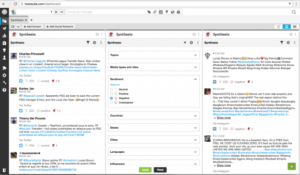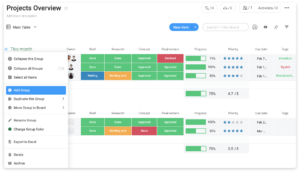Your Guide to Marketing Information Management
Marketing information management enables businesses to take advantage of internal, competitive, and market data. By engaging marketing information management solutions, companies can mitigate disorganization, gather insights, and execute more informed decisions.
Updated June 9, 2022
Change happens quickly. As the day-to-day lives of consumers transform, so too do their habits. Marketers can’t operate under assumptions about what, why, and how consumers’ buy.
Instead, consumer data helps marketers shift strategically. Data empowers businesses to make informed decisions about who to target and how to do so effectively. That information is especially important as rapid change remains a facet of consumers’ daily lives.
Recognizing the importance of insights, CMOs invested more of their budgets in marketing analytics than any other marketing program or operational area. To prevent analysis paralysis, businesses will need a strategy for leveraging an increased amount of data. Marketing information management will help companies to capture, assess, and deploy data insights.
Looking for a digital marketing professional? Connect with a top-rated digital marketing agency on Top Design Firms.
Need help selecting a company?
Based on your budget, timeline, and specifications we can help you build a shortlist of companies that perfectly matches your project needs. Get started by submitting your project details.
What is Marketing Information Management?
Marketing information management is the process of gathering, analyzing, and organizing data — internal and external. This includes market research and competitive intelligence, among other data collection strategies.
Marketing information management helps businesses capture, understand, and leverage valuable market information, enabling them to make informed decisions about their futures.
Why Is Marketing Information Management Important?
Marketing information management enables companies to keep up to date with trends and maintain a competitive advantage over competitors. Marketing information management involves collecting a breadth of data, including:
- Consumer preferences
- Consumption patterns
- Market growth
- Product launches
- Social media
Each business determines what data is pertinent for its marketing information management systems to gather, assess, and organize.
Depending on your business's data selections, you gain different insights. Marketing information management systems primarily produce insights in two major areas of businesses’ operations:
- Customers
- Markets
Customers
A marketing information system enables businesses to track customer demographics, attitudes, and behaviors. For example, tracking sales helps companies better understand buying cycles, client preferences, and sales team performance.
Moreover, tracking social media engagement informs them about their brand perception. Hootsuite, for example, enables brands to monitor messages and mentions across social media platforms.

Markets
Marketing information management systems that gather market intelligence encourage businesses to make decisions in line with market demands. The system provides companies with greater knowledge of their specific markets and competitive landscapes, helping them to craft strategic plans and predict growth.
Whether companies collect data on competitors’ product launches or market tendencies, they’ll build a robust database. A lack of organization may lead businesses to miss key insights or misread forecasts, leading to wasteful marketing spend.
Why Companies Choose to Have Marketing Information Management Systems
A marketing information management system provides processes for not only gathering and assessing but also organizing data. It protects businesses against human error and misplaced investments by ensuring details don’t fall through the cracks.
Marketing information management ultimately supports the bottom lines of businesses. The systems establish an analytical foundation to inform the continuous improvement of various processes — from product development to digital marketing.
Additional benefits of marketing information:
- Centralizing data from numerous marketing channels
- Managing marketing budgets and campaign planning
- Building reports on campaigns’ performances
- Sharing data and assets across teams
By investing in marketing information management systems, companies realize a multitude of benefits. Marketing information management empowers companies with diverse insights to inform improvements throughout their operations.
Who Uses a Marketing Information Management System?
Despite the name, a marketing information management system shouldn’t be exclusive to a company’s marketing team.
Rather, nearly every team in a company is likely to benefit from the data collected, analyzed, and organized in the system. Here’s how different teams benefit from the insights a marketing information management system offers:
- Product team: Insights into consumer behaviors can help product teams identify improvements and implement them to build more successful products.
- Sales team: Marketing information systems collect and manage information about customers, providing sales teams with a clearer picture about their audience and enabling sales staff to develop more effective pitches.
- Customer support team: Tracking customer behaviors through the system helps support teams maintain and strengthen relationships with existing customers.
- Leadership team: The system presents leadership teams with organized data, providing a clear view of the company’s and market’s performance.
By sharing access and information, marketing teams help organizations make smarter decisions and move in a unified direction. Marketing information management systems provide deep insights into businesses’ customers, markets, and processes. The systems benefit not only marketing teams but also organizations as a whole.
What Data Should Marketing Information Systems Track?
Marketing information management systems enable companies to track a variety of data but tend to focus on three sources:
- Internal data
- Competitor insights
- Market research
Internal Data
Tracking internal data means gathering information from sources exclusively accessible to a company’s employees. By tracking this type of data, businesses generate insights into internal operations. Internal data includes, among others:
- Sales records
- Product information
- Brand strategy
- Strategic plans
By tracking this data, businesses can build a greater understanding of their operations. Using a marketing information management system to do so provides everyone within the organization access to that knowledge base and streamlines processes.
Competitor Intelligence
Businesses that track competitor insights collect data from third-party sources such as professional, trade associations, and market publications, among others. Tracking this type of data can answer important questions, including:
- Which businesses lead the market?
- What trends can companies take advantage of?
- What audiences do competitors actually hit?
- Do competitors more effectively target overlapping audiences?
- How do competitors drive consumers to their products?
In addition to internal data, marketing information management systems enable businesses to collect, analyze, and organize data from third-party sources. As a result, the solutions offer companies greater insights into how their operations and market strategies perform.
Market Research
Market research involves collecting data about a business’s buyers personas, target audience, and customers. By gathering market research data, companies learn about the viability of products and services. Market research focuses on a business rather than its relationship to its competitors. Data may include:
- Customer reviews
- Survey results
- Focus group outcomes
- NPS scores
Marketing information management solutions support the collection of market research data through internal and external sources.
By using a solution to gather market research, businesses can identify opportunities to improve their products, services, and strategies to better satisfy customers.
For example, monday.com enables users to manage a range of projects, campaigns, and information
Source
Using the solution, marketing teams can track email campaigns, manage strategic plans and OKRs, and oversee social media – all of which are advanced marketing strategies.
The tool integrates with numerous other tools, such as HubSpot, Facebook Ads, and MailChimp, to streamline data management. By using a marketing information management system to gather data from internal and external sources, businesses can collect, analyze, and organize a significant amount of information in logical forms.
This empowers team members throughout your organization to make informed decisions and yield greater results.
Marketing Information Management Gives Visibility & Control to Businesses
By gathering, assessing, and organizing data from internal and external sources, marketing information management solutions empower businesses to take control over their own data. The solutions enable them to ground decisions in data, promoting the success of strategic initiatives.
Tracking a diverse set of data through marketing information management solutions helps businesses stay ahead of the curve on a multitude of fronts.
By maintaining and organizing information, the solution mitigates errors and supports easy distribution across teams. Businesses that collect data from a variety of sources and provide a multitude of teams with access to marketing information management systems promote continuous advancement across the organization.
By basing decisions in data, business leaders can feel confident they’re on the right track. If you need help identifying the best marketing information management solution and how to implement it, consider talking to a full service digital agency.
Additional Reading:
Need help selecting a company?
Based on your budget, timeline, and specifications we can help you build a shortlist of companies that perfectly matches your project needs. Get started by submitting your project details.
